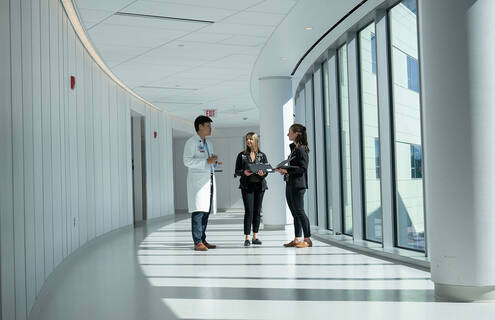
At Dartmouth Hitchcock Medical Center's Heart and Vascular Center, Heart Team experts take a team approach to patient care.
"When your patient comes to us for cardiovascular care, they won't receive care from only one cardiologist," states Michael N. Young, MD, FSCAI, RPVI, interventional cardiologist at Dartmouth Hitchcock Medical Center and Assistant Professor of Medicine at the Geisel School of Medicine at Dartmouth. "Instead, they'll be surrounded and supported by a team of experts in several cardiac subspecialties and other non-cardiac specialties."
Cardiovascular subspecialists work together to care for people with coronary artery disease, valve disease, pulmonary embolism, cardiogenic shock, cardioembolic stroke, high-risk pregnancies and adult congenital heart disease. They also work with teams in other hospitals, specifically when referring and preparing a patient for a heart transplant.
According to Dr. Young, who serves as the Director of the Cardiac Catheterization Laboratories and the Structural Heart Disease Program, this collaborative care "reassures patients, encourages shared decision-making between patients and their care team, and ultimately leads to an optimized patient experience with improved outcomes—particularly for patients with serious cardiac conditions."
The benefits of collaborative cardiac care
In a paper published in July 2023, Dr. Young and his team highlighted the benefits of the Heart Team approach and presented a "Five Star" model for Heart Team collaboration.
The paper, titled "Building and Optimizing the Interdisciplinary Heart Team," was published in the Journal of the Society of Cardiovascular Angiography & Interventions.
"Research shows that patients who receive multidisciplinary care have increased survival rates, lower mortality and outcomes that meet or exceed national guidelines—and our internal research supports these claims," said Dr. Young. "Our paper outlines the core principles that guide the team-based cardiovascular care we provide."
When Dr. Young and his colleagues spoke to patients about their experience with the interdisciplinary Heart Team, the response was overwhelmingly positive, with many patients enthusiastically praising the approach and the care they received.
"One of the things that our patients value most is our team approach to care and ability to bring that back to the patient bedside," said Dr. Young. "When patients feel supported, reassured and backed by a cohesive group of experts, they tend to have a more positive care experience and better outcomes.
"There are emerging data that support this claim, and over the years here at Dartmouth, we have developed our Multidisciplinary Heart Teams accordingly."
Our Heart Team model
To address these unique patient needs, the Heart and Vascular Center has created several multidisciplinary Heart Teams, including:
- Adult Congenital Heart Disease team
- Brain Heart team for stroke prevention
- Cardiogenic Shock team
- Cardio-Obstetrics team
- Complex Coronary Artery Disease team
- Heart Failure/Heart Transplant team
- Left Atrial Exclusion for Atrial Fibrillation team (LEAF)
- Pulmonary Embolism Response Team (PERT)
- Structural Heart and Valve Disease team
Each team meets regularly to review and discuss patient cases. This includes considering test and imaging results, research-backed treatment guidelines, patient preferences and lifestyle factors while developing consensus-based care recommendations.
The team's official recommendation is then presented to the patient and family members for review and discussion. After the patient and care team agree on a treatment plan, the Heart Team implements the plan, collects data and analyzes feedback and outcomes. The goal is to evaluate the success of the treatment, patient experience and quality of recommendations.
What happens if someone has a pulmonary embolism?
For example, if a patient is diagnosed with a pulmonary embolism, they will be seen by a team that may include a combination of physicians from the following specialties: vascular medicine, interventional cardiology, critical care and imaging. Together, the team will assess the patient's condition, review the available surgical and nonsurgical treatment options and develop a treatment plan designed to relieve symptoms and reduce the risk of long-term complications. After initial treatment is complete, the team will provide longitudinal follow-up care for the patient and analyze relevant outcomes.
What happens if someone is experiencing severe heart failure from valvular heart disease?
A patient experiencing severe heart failure related to a failing valve will be seen by a cardiac surgeon, interventional cardiologist and general cardiologist. In certain situations, this team may expand to include specialists from advanced heart failure, palliative care or other areas in medicine. The team will evaluate a range of treatment options, including valve replacement, ventricular assist devices, medications and other treatment options, with the goal of reducing future complications, preventing hospitalization and improving quality of life.
"Effective cardiac care can't be delivered in silos—especially when many conditions require a multifaceted approach that combines elements of cardiac surgery, interventional cardiology, general cardiology, electrophysiology and more," said Dr. Young. "As new cardiac treatment options emerge, it's essential for cardiologists to work together to determine when and how these novel therapies can and should be used. Through our collaborative work and ongoing research, our goal is to demonstrate the success of our approach and encourage other hospitals to adopt this model for the benefit of their patients."
Reference
Lee C, Tully A, Fang JC, Sugeng L, Elmariah S, Grubb KJ, Young MN. Building and Optimizing the Interdisciplinary Heart Team. Journal of the Society for Cardiovascular Angiography & Interventions, Volume 2, Issue 6, 101067.